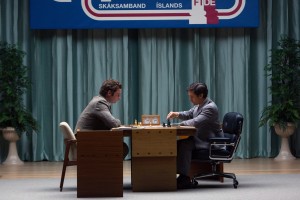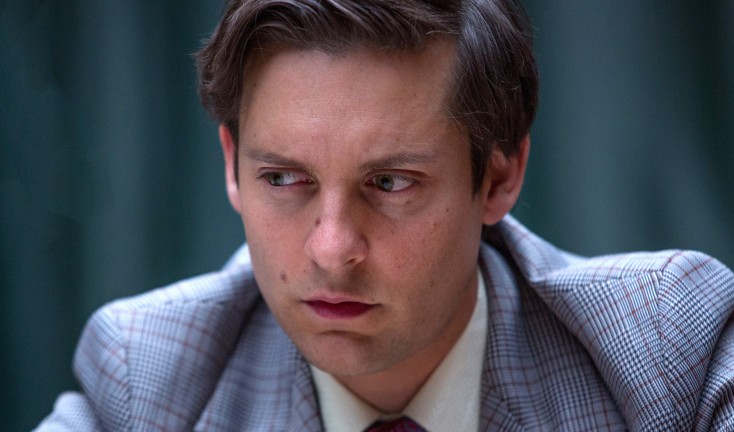
Liev Schreiber (left) stars as Boris Spassky and Tobey Maguire (right) stars as Bobby Fischer in Edward Zwick’s PAWN SACRIFICE. ©Bleecker Street.
By ANGELA DAWSON
Front Row Features
HOLLYWOOD—Tobey Maguire tackles the dual role of producer and star of the Bobby Fischer biopic “Pawn Sacrifice.”
Fischer was the mad genius American chess player who defeated the then reigning Russian chess master Boris Spassky in a 21-game tournament in Iceland in 1972. Audiences were glued to their TV sets as they watched the best chess players in the world go mano-a-mano in the World Chess Championship. Though Fischer ultimately won the event, he paid a high price for his victory: his sanity. The New Yorker suffered delusions of paranoia that were only exacerbated the more he played.
The married father of two (Maguire is married to jewelry designer Jennifer Meyer) explained that when he embarked on the film project, he didn’t know a lot about Fischer, who died in Iceland in 2008 after he was exiled from the U.S. for participating in an unsanctioned rematch with Spassky. Producer Gail Katz (“The Perfect Storm,” “Outbreak”) approached him and the story piqued his interest, he says. The drama, directed by Ed Zwick (“The Last Samurai”), also stars Liev Schreiber as Spassky, Michael Stuhlbarg as Fischer’s manager Paul Marshall and Peter Sarsgaard as Fischer’s teammate Father Bill Lombardy.
The complex character study is a change of pace for the actor, who in recent years was known for his work in three “Spider-Man” films.
Dressed comfortably in a blue and grey flannel shirt and jeans for an interview, Maguire spoke about taking on the controversial chess master character and to what extent his fondness for poker helped him arrive at the competitive mental state to depict such an enigmatic individual.
Q: What led you to this project, and especially stepping in as a producer?
Maguire: I knew that he was a great chess player and I had some sense that he had a difficult personality. So, in doing some research on Bobby, I discovered some things that gave me pause about him, some of the things he said later in his life that are, I don’t know, awful. But digging into him, the story is quite fascinating. In particular, the time that we ended up focusing on in the film, which is this really difficult, fragile, paranoid guy at the center of a storm. There’s a sports movie trajectory set in this really tense political climate that I thought would be a fascinating framework. So basically, you have a sports movie structured with this character standing in the center of it versus a kind of front-to-back biopic. I thought that was the way to go. I wanted to layer in as much about Bobby Fischer’s character as possible within that story.
Q: Bobby Fischer had difficulty dealing with fame. How do handle the pressure of fame? Do you have a good tip on how to handle it?
Maguire: (laughing) I’m now wearing a paper bag. I didn’t take any tips from Bobby, really, about his reaction to it. I think it can be kind of jarring. In my own life, I’ve understood that one could get famous and even is likely to get famous when you do movies at a certain level that are likely to get out there and have a certain level of awareness. But it didn’t quite prepare me for the reality of what that meant in my day-to-day life. Like anything in life, something comes at you and you try to understand it and make adjustments to make it tolerable, even positive, if possible. I don’t think Bobby spent a lot of time learning or growing past certain things, socially. He really was focused on chess and was fairly antisocial.
Q: Could you talk a bit about you and Liev Schreiber reenacting that historic chess match on screen?
Maguire: Yeah, I think that it’s something that (director) Ed Zwick and I talked about quite a bit, which is how do you dramatize games of chess and make it engaging for anybody who might be watching it. We knew it was largely going to be silent. It is actually interesting if you know the stories of the people coming in to the match and you know what’s at stake for them. You know in Bobby’s case what could throw him off his game, and he becomes his own challenger as well as the challenger in front of them, knowing all of those things and being current on all of that in the film, and then you’re just watching it. You’re watching to see if this guy gets through this game and plays the game against this other guy. Even if you don’t know what they’re doing with the chess pieces, you’re just wondering, “ Are they going to make it?” So we’re employing all of these different tactics to try to engage an audience without requiring that they have an understanding of anything about chess.
Q: Fischer’s upbringing by a single mom, who was an avowed and active communist on a U.S. government watch list is depicted on screen. Do you think that helps explain his paranoia as an adult?
Maguire: Yeah. I don’t know that that is a perfect and clean explanation of it or I don’t think that was our intention, but he did grow up in that atmosphere, and I think that that certainly had an effect on him. Maybe he also had a genetic disposition and was more susceptible than somebody else to being paranoid and having delusions. You can be paranoid and also there may actually be people watching or talking about you or whatever. It definitely still has a sense of fear about it, and I think those things can coexist and you can still be stricken with paranoia.
Q: Has playing this part and studying chess for this role made you a better player?
Maguire: What I learned in this movie is that I am not a good chess player. I’m good enough to not play. I know enough about it to not play. It was sort of discouraging as I was learning about chess and talking to international masters and grandmasters and what it takes to be really, really good at the game, and the truth is it just takes a tremendous amount of time. You have to play a lot. There’s a tremendous amount of memorization. So just basic memorization, understanding opening sequences, and then of course, there is theory. But you could flash a position to somebody who is a really high-level chess player, and somebody who is not, and you might have a hard time figuring out where one of those pieces went. An excellent chess player will probably be able to set up the whole board and have looked at it for, like, a second and have it memorized. It’s just that they’re so familiar with it. So I have determined that it would take me years of playing every day for hours a day to be any good as well as studying, reading and studying past games to become good at it. So somewhere along the way I determined that I was not going to pursue that.
Q: What did you do to prepare for this? What footage did you watch and what books did you read?
Maguire: I watched everything. I listened to everything as far as I know that existed or anything that I could find. I talked to anybody who would speak to me that knew Bobby Fischer. I read several books on Bobby and articles and throughout the whole process would listen to Bobby or watch Bobby. I just immersed myself in it.
Q: You’ve played a lot of poker and won some money. Do you think it helps that you had that competitive experience in terms of playing a competitive chess player?
Maguire: It doesn’t hurt. I mean it’s very different. Bobby himself hated games if there was any element of chance. When he was around six years old, would play some other games. But where there was any element of chance like cards or dice or something like that, he would get really frustrated because his skill would maybe gain him an advantage, but then the chance element might take that advantage away, and he almost felt that was unfair. So he no longer played games that have any element of chance and only wanted to play strictly skill-based game, which essentially is chess. He had all of the control. It’s all skill. And the communication is very pure. He loved that there is this framework and essentially this pure communication with the person he was playing with. There is no kind of manipulation or something else that could happen. It was like a safe place to communicate purely. But I also think it doesn’t hurt that I’ve played games and sort of battled with people over boards and across felt tables.





